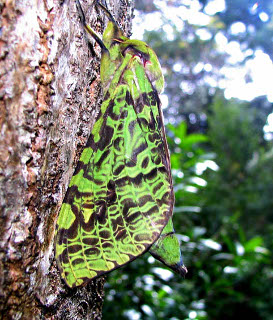New Zealand's lepidoptera: Aenetus virescens ghost moth
Community and Forum → Blog → New Zealand's lepidoptera: Aenetus virescens ghost moth
Lev Bely, 26.10.2012 21:03

Aenetus virescens is a moth of the family Hepialidae and one of the largest native moths of New Zealand. Puriri moth as it's called has a 15cm wingspan for what this happens to get mistaken for a bat. This moth spends nearly all its life in the larval stage inside a trunk of some trees—eucalyptus, for instance, and this stage can last up to seven years!
Trees that serve as homes to A. virescens larvae, can be identified by trunk holes, from which caterpillar occasionally gets out when leaves its 7” shaped squat to munch on the bark around the hole. Having transformed into a moth, puriri leaves its home and the latter gets immediately occupied by a tree cricket named “weta”.
In fact, New Zealand's tree putaputaweta, or marble-leaf, is named for these very weta crickets, which settle down in the former puriri larvae homes, which in turn quite prefer putaputaweta trees to live in. Such single tree can be infested with many puriri larvae at once, and then it inevitably turns into a living block to weta crickets.
The more curious is that after seven years spent inside a tree trunk, puriri imagoes live just for two days and then die. They have no mouthparts they could use to feed, and their only mission is to mate and make offspring within these two days. Puriri can emerge throughout the whole year, though it's more likely to happen from October to December. Sadly, this native New Zealand's moth is rather rare to meet.
Guys from Nga Manu Nature Reserve in Waikanae still took their time and had patience to make a time-lapse video of the puriri moth emersion as it comes out of its wooden squat and spreads wings. Cricket, get your bags ready!
Stuff.co.nz, http://www.stuff.co.nz
Photo: puriri moth, Mangakotukutuku Stream Care Group, http://www.streamcare.org.nz
All the rest posts on: curiosity, New Zealand
Comments
New comment
Note: you should have a Insecta.pro account to upload new topics and comments. Please, create an account or log in to add comments.
* Our website is multilingual. Some comments have been translated from other languages.
Random species of the website catalog
News
- 02.03.2025: Moscow Insect Fair: New section on the Insecta.pro Website
- 31.12.2024: If you need to upload a lot of photos to Insecta.pro website
- 10.12.2024: Новое поле в «Поиске энтомологов»
New photos (27.03.2025)
Fresh from the community
- 23:09, M. Niobius: Здравствуйте. Тульская область, окт...
- 12:52, L. Bolshakov: Петр, см. там подробности: https://...
- 12:32, P. Khramov: Лавр, источник скиньте, пожалуйста....
Popular insects
Recommended blog topics
- ICZN Election of Commissioners
- Meanwhile, in Kotelnich
- Interview with Alexander Zatakovoy, one of the wild Russian entomologists
- It's dinner time... in prison



























